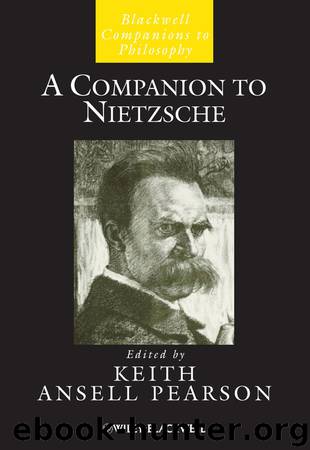A Companion to Nietzsche by Ansell Pearson Keith;

Author:Ansell Pearson, Keith;
Language: eng
Format: epub
Publisher: John Wiley & Sons, Incorporated
Published: 2014-08-19T16:00:00+00:00
7 An “Unknown Wise Man” between Body and Ego
With this demonstration of the independence of body’s reason as construed on analogy to art we could end our investigation of the “great reason” of the body. For all that follows in Zarathustra’s fourth speech serves, on the one hand, to illustrate the character of consciousness as “instrument and plaything,” while providing on the other hand a diagnosis and prognosis for the despisers of the body. These have lost the artistic impulse “to create beyond themselves,” and thus have lost trust in the reason of their own bodies. They choose to despise that which they can no longer stand to acknowledge: the body. Their rage towards “life” and “earth,” and their “envy” towards every creative engagement with existence, have no future. In the words of Zarathustra: “You are not bridges for me to the overman” (Z I, “Despisers”) – a clear sign that this questionable concept, too, is best defined and defended as an aesthetic term.
Besides “body” and “ego” Zarathustra uses another, inconspicuous word to which he assigns an importance which can hardly be ignored. It is the pronoun “self” (Selbst), which appears only as a substantive in this speech, and which evidently refers to something between “body” and “ego”:
Sense and spirit are instruments and playthings: behind them there is still the Self. The Self seeks with the eyes of the senses, it listens also with the ears of the spirit.
Ever listens and seeks the Self; it compares, masters, conquers, and destroys. (Z I, “Despisers”)
This is a confusing speech: after all that has been said, one would have expected that there be only body “behind” sense and spirit. Body, we were told, “creates” for itself its own “great reason,” of which the “instrument” and “plaything” is the “ego” of “small reason.” Yet here we find “behind” the ego the very word which, in common usage, serves as a pronoun for the ego. The “self” is, in everyday language, an expression for persons who can say “me”: the consciousness of the ego is that of the self. The pronoun may be used only metaphorically in the case of those unities which are active in analogy to self-consciousness – which function “by themselves” and thus “automatically.” Seen in this way, everything which transpires or happens without an external cause happens “by itself.”
Yet this is obviously just a circumlocution for the assumed originality and primality of the integrity of a certain unity grasped from without, and nothing more. The “self” indicates the spontaneity of a totality – and thus abbreviates a figure of speech which would have to be much too long if the process were to be described in its actual complexity. And so we say that the larva in metamorphosis moves “by itself,” and that in this way a butterfly comes into being. The phrase “by itself” indicates that no immediate, external influence is at work, though we certainly know that many external factors are involved in the metamorphosis which transpires within the cocoon.
Download
This site does not store any files on its server. We only index and link to content provided by other sites. Please contact the content providers to delete copyright contents if any and email us, we'll remove relevant links or contents immediately.
The remains of the day by Kazuo Ishiguro(7544)
Tools of Titans by Timothy Ferriss(6938)
The Black Swan by Nassim Nicholas Taleb(6185)
Inner Engineering: A Yogi's Guide to Joy by Sadhguru(5888)
Giovanni's Room by James Baldwin(5873)
The Way of Zen by Alan W. Watts(5790)
The Six Wives Of Henry VIII (WOMEN IN HISTORY) by Fraser Antonia(4786)
The Power of Now: A Guide to Spiritual Enlightenment by Eckhart Tolle(4749)
Astrophysics for People in a Hurry by Neil DeGrasse Tyson(4614)
Asking the Right Questions: A Guide to Critical Thinking by M. Neil Browne & Stuart M. Keeley(4567)
12 Rules for Life by Jordan B. Peterson(3725)
The Ethical Slut by Janet W. Hardy(3494)
Skin in the Game by Nassim Nicholas Taleb(3456)
Housekeeping by Marilynne Robinson(3397)
The Art of Happiness by The Dalai Lama(3378)
Double Down (Diary of a Wimpy Kid Book 11) by Jeff Kinney(3267)
Skin in the Game: Hidden Asymmetries in Daily Life by Nassim Nicholas Taleb(3259)
Walking by Henry David Thoreau(3228)
12 Rules for Life: An Antidote to Chaos by Jordan B. Peterson(3197)
